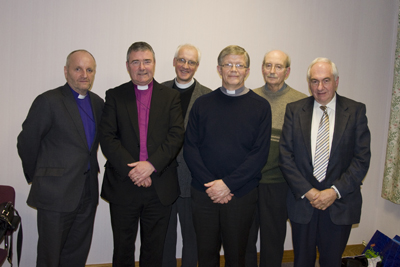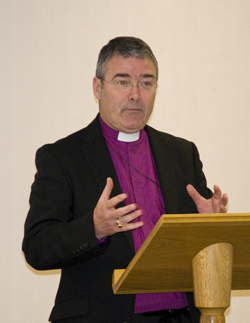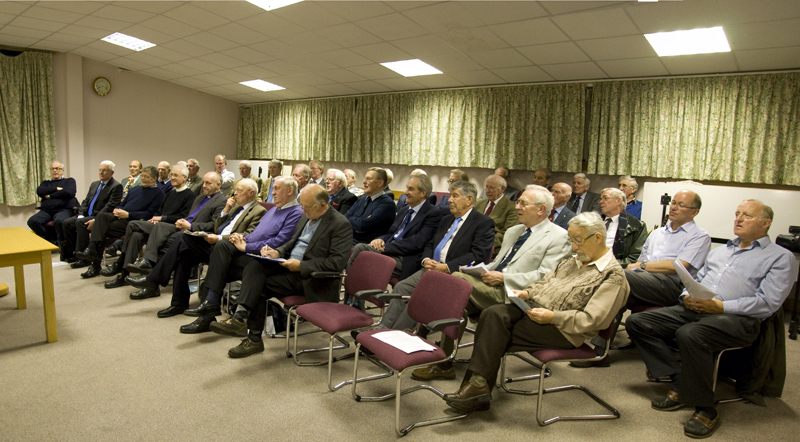
The evening commenced with the Triennial General Meeting chaired by CIMS Chairman, the Rt Revd Alan Abernethy. Officers and Executive Committee members were elected for the three years commencing 1 Sept 2013 and a Report and Financial Accounts for the previous three years were received.
This was followed by a talk by the Rt Revd John McDowell The title for the talk gave little clue to the subject for the evening. He began his story in France on the 14 July 1789 when citizens of Paris stormed the Bastille. The Revolution which followed championed the supremacy of human reason over dogmatic faith in a heavenly God. The bloodshed and the terror which engulfed France appalled the people of England on the other side of the English Channel. This adverse reaction was best articulated by a remarkable Irishman, Edmund Burke, in a book which made him famous: “Reflections on the Revolution in France”.
Bishop Alan Abernethy (CIMS
Chairman), Bishop John McDowell (Speaker),
the Very Revd Gregory Dunstan
(CIMS General Secretary),
Canon Robert Jones (Rector of Malone), Charles
Jury (Malone Branch Chairman),
Arthur Macartney (CIMS Hon Lay Sec)
The aversion in England to events in France strengthened social institutions in England as well as the established Anglican Church, The Church of England. However it was not about this that Bishop McDowell wished to speak. Besides the strengthening of the established churches in England caused by revulsion to the horrors of the French Revolution other smaller Christian sects flourished and it was one of these was the subject of the Bishop’s talk.

In 1819, four years after the defeat of Napolean at Waterloo, there was a wealthy man called Henry Drummond, a banker who had been educated at Harrow and Oxford and was a Member of Parliament and very much a member of the English established class. Uncommon for people of his class Drummond was a deeply religious man and like many religious men of his time consumed by interest in “Lost Things” and the ”end of the world”. Between 1826 and 1830 he organised in his home in Kent what became known as the Aldbury Conferences. At these assemblies the Bible was studied, especially the Book of Revelation.
He gathered together a group of influential interested people to help him. They elected 12 Apostles to oversee their activities. Drummond hoped that what he had begun would not become a sect. However the 1851 Census asked to what church you belong and they replied “The One, Holy and Catholic Church”, which a clerk in the Census Office shortened to “The Catholic Apostolic Church” by which they became officially known.
There were two churches in Ireland, one in Dublin and the other in Cromwell Road, off Botanic Avenue in Belfast. The Belfast Church opened in 1886 and its last priest, a most Saintly man called Milward, died in 1946. The last to be married in the Belfast church were Elizabeth Laws McQuillan and William James Frederick McDowell, the Bishop’s mother and father, and the last two children to be baptised were Robert Gyle McDowell and Frances Jane McDowell, the Bishop’s older brother and sister.
The Rt Revd John McDowell
Bishop of Clogher
